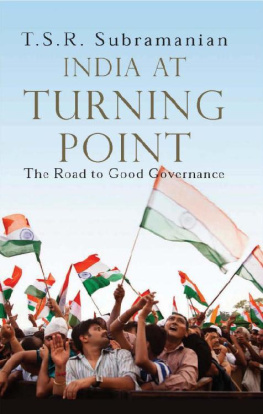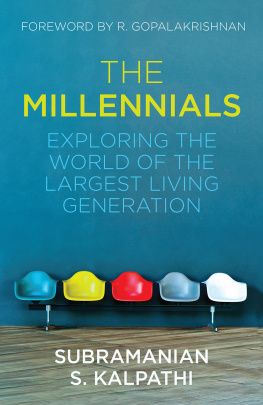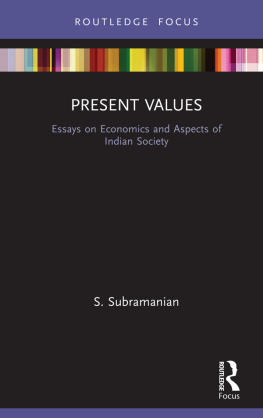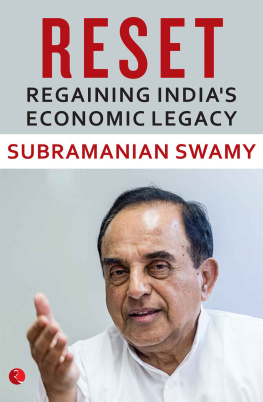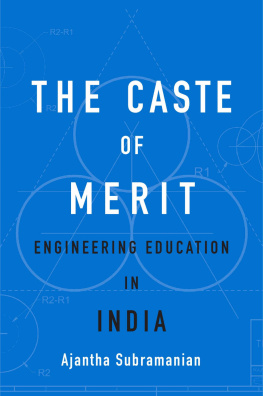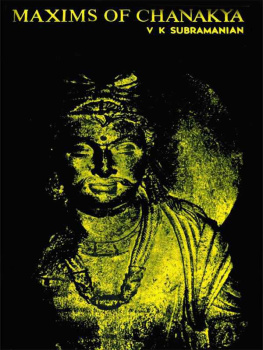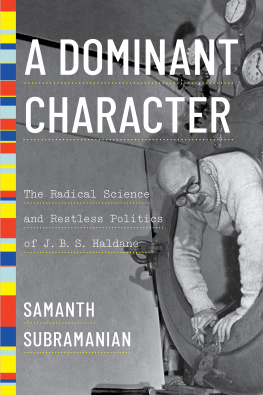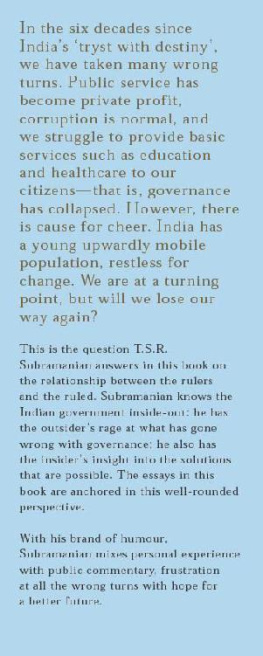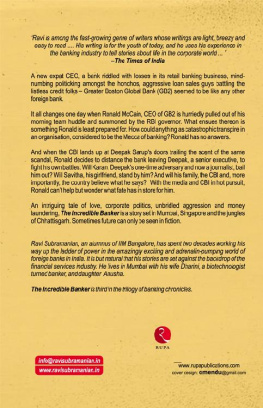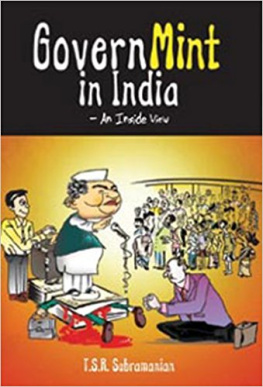INDIA AT TURNING POINT
Published in Rainlight
by Rupa Publications India Pvt. Ltd 2014
7/16, Ansari Road, Daryaganj
New Delhi 110002
Sales centres:
Allahabad Bengaluru Chennai
Hyderabad Jaipur Kathmandu
Kolkata Mumbai
Copyright TSR Subramaniam 2014
eISBN: 9788129133748
All rights reserved.
No part of this publication may be reproduced, transmitted, or stored in a retrieval system, in any form or by any means, electronic, mechanical, photocopying, recording or otherwise, without the prior permission of the publisher.
First impression 2014
10 9 8 7 6 5 4 3 2 1
The moral right of the author has been asserted.
Typeset by RECTO Graphics, Delhi.
Printed at [PRINTERS NAME, CITY]
This book is sold subject to the condition that it shall not, by way of trade or otherwise, be lent, resold, hired out, or otherwise circulated, without the publishers prior consent, in any form of binding or cover other than that in which it is published.
For
THE POOR CITIZEN OF INDIA
who continues to pay for the sins and poor governance by the ruling classes of this democracy; where everything is done in his name, but he is left holding the sack, continuing to remain in the most miserable condition, tolerating what elsewhere would have led to a bloody revolution decades back. Surely he deserves the opportunity to blossom.
CONTENTS
ACKNOWLEDGEMENTS
Vinay Sitapati helped me from the beginning, commenting on the structure and contents, often with some brutal honesty (well justified); he has probably made a very poor draft passable! I am very grateful to him. Shankar and Amy Sitapati read through the draft, and made valuable suggestions.
Ambassador R.L. Narayanan has done much high quality research work on the coalition governments of 1996-98, based on contemporary documentation and media reports. Much of Chapter 15 incorporates his conclusions, with some comments from me. I gratefully acknowledge his contribution.
Chander Lekh spent a lot of his spare time helping me with the draft of this publication. My thanks to him.
The poor ground conditions, accompanied by some carelessness from me, were responsible for an Achilles tendon tear in my leg, confining me to my residence for a couple of months, and providing me the time to write the book. My thanks to the grounds committee of the Noida Golf Club!
PREFACE
Sudiksha is a 13-year-old child studying at VidyaGyan School in a village not far from Delhi. VidyaGyan is a remarkable school. It admits bright 10/11-year olds from poor village schools, including the most backward districts, and gives them a free education of high quality. When Sudiksha came to VidyaGyan three years ago, she hardly knew any English, was shy and diffident. After just three years of exposure to trained teachers, resources, and nutritious food, she can outperform the most privileged children from Delhis elite private schools. Its a simple lesson: Indians have the ability to compete with the best, if only we give them the opportunity.
It is this opportunity that we have failed to provide our citizens. The reality in 2013 is far removed from the promise of our Constitution, given by us to ourselves in 1950. At that turning point in our history, we simply took the wrong turn. In every index of human developmenteducation, health, even peace and harmonyIndia ranks near the bottom of the world. For example, practically every other country in the world provides electric power without break; we are unable to provide our citizens with this basic service. As a result business suffers, households are hurt, farmers are seriously handicapped, and millions of our poor children are unable to study at night.
We cannot blame our past; most countries in Asia who started on their development path after we did, are now far ahead of us. We also cannot blame our people. It is not they who have failed us, it is our government which has failed its people. Poor governance is the one factor that has to take responsibility for this state of affairs. If we are able to fix our governance problems, then every village school can become like VidyaGyan, every child in India can become tomorrows leader.
I have been in the Indian government for 37 years. I have seen public service at the village, district, divisional, departmental and state secretariat levels. I have also had the privilege of functioning, during an eventful period as the official head of the largest Indian state, Uttar Pradesh. I have worked in central ministries, and was privileged to be the official head of the central administration for two years. I can truly call myself an insider.
But since retirement 15 years ago, I have become an outspoken outsider. I have not held any official post. Instead, I have been associated with public service outside of government. Through writing and television appearances, I am a consistent voice of governance reformand dont hesitate to take on the powers that be. I should also add that my post-retirement experience has led me to review and revisit a number of opinions I held strongly in service life; perhaps I didnt know enough then to take a broader view. One of my books, Journeys through Babudom and Netaland: Governance in India, has been well received, and is quoted even now. I have been associated with the corporate sector, and have served on many boards. However, what makes me happiest is my close association with a number of charity programmes such as VidyaGyan. As an insider-outsider, I can see both sides of the link between governmental activities and public welfare. I can relate to the interface between the government and the governed.
The essays in this book deal with this relationship between the governed and the government. Why are places in India, like those in which Sudiksha grew up, so lacking in basic facilities? What has gone wrong with our governanceand how do we fix it? While I have written this book more to please myself, I feel I am qualified to call myself an outsider as well as an insider in governance. I owe it to myself to share my thoughts, for whatever little it may be worth. This book is also a personal retrospective. I have weaved in my experiences, incidents from my life, mainly with a view to bring attention to public policy and implementation issues, rather than recount them for their own sake.
Except for one early chapter and the last one, which are in the nature of reminiscences, most other references to my experiences are intended to highlight structural weaknesses in the system, and lead to reforms. In the process, perhaps there has been repetition of a few incidents from my earlier books. I have not edited them out, as they flowed naturally. This book is not an autobiography, even though I have dealt with many incidents and events in my life. My closest thoughts and most important experiences, I have kept to myselfthis book is not a vehicle for that. I expect these will depart with me, unrecorded. This book relates to my experience with public policy issues and implementation measures.
Each chapter is conceived as a self-contained essay, on one theme each. I have also interspersed the discussion with personal experiences that could have relevance to the theme. I have tried to suggest reform measures in each chapter; these need to be developed into concrete actionable policies and programmes. The last three chapters are more or less personal reminiscences, perhaps not fully relatable to policy issues. The reader interested in public policy could skip thoseor forgive an old man his indulgences.

